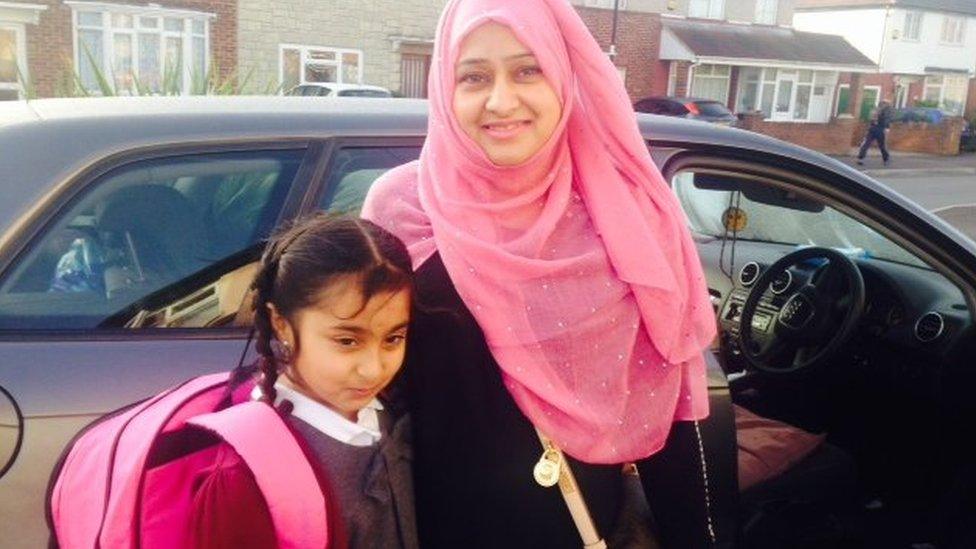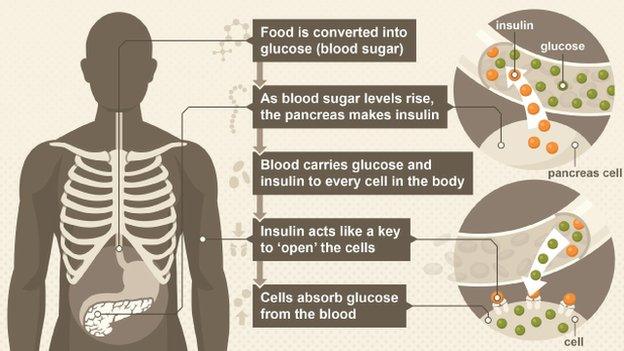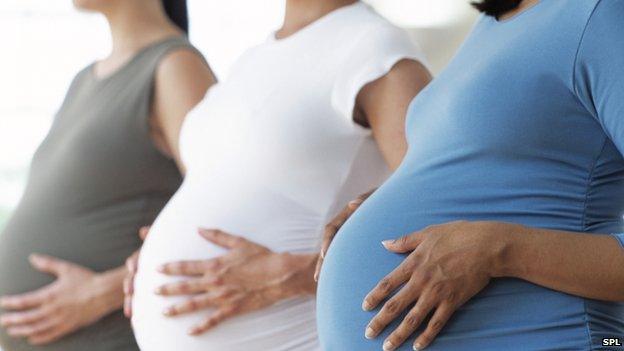Diabetes in pregnancy: 'I changed my life'
- Published

Mum-of-four Shaida Akbar with her youngest daughter, Hajrah
At the age of 24, Shaida Akbar developed gestational diabetes, like thousands of pregnant women every year.
According to Diabetes UK, the hormones that kick in when a woman is pregnant prevent insulin from controlling blood sugar levels correctly.
The charity is now warning women to make sure they are a healthy weight, which it says is the most important thing they can do to reduce their risk.
"When the doctor told me I had diabetes whilst pregnant, I was shocked but realised I had to make changes," Shaida says.
"I must have been a size 18 at the time. Having the condition means you have to look after yourself more when you've got your baby on the way."
According to the NHS, up to 18 in every 100 women giving birth in England and Wales may be affected.
It does not always have symptoms, but needing to urinate more often and tiredness are two of the signs of high glucose levels in the blood.
Shaida says: "With Asian families and when you're overweight, you're considered more of a risk.
"I had to take supplements, eat more boiled vegetables and just look after my health."
Doctors may choose to give dietary and lifestyle advice or treat the condition with tablets or insulin.
If left untreated, the condition can be a risk to the health of the mother and baby, potentially leading to birth defects, babies being born overweight and emergency Caesarean sections. Miscarriage is also a danger.

How the body controls blood sugar levels
"My children were a bit heavier, because that's a risk when you have diabetes, so they had Caesarean births."
Libby Dowling, a senior clinical advisor at Diabetes UK, says: "You need to have regular appointments with midwives when you have gestational diabetes.
"Medics will provide you with a blood sugar monitor and show you how to use it to make sure you are OK.
"Anybody can develop gestational diabetes, but women from South Asian backgrounds, those who have family history of the condition and being overweight are all linked to developing it. And if you are at risk, the NHS do a test, external for it."
In many cases, sugar levels can return to normal after the baby is born. But researchers at Diabetes UK say having had gestational diabetes does make type 2 diabetes more likely. That was the case for Shaida, who is now in her early 40s.
Lifestyle shake-up
"Having diabetes changed my life," she says.
"I would stay at home before, I wasn't bothered about exercising.
"But after finding out about my condition, I cut down on fast food and rice.
"It took a lot of exercise and motivation, but I slimmed down from a size 18 to a size 12.
"I went to the gym every day. I did 40 minutes on the machines, and I walked a lot more.
"I'm not as tough on myself now, but I still do go two or three times a week to the gym.
"And it's not just me who I'm trying to get active.
"In Slough where I live, I set up a community group called Upton Lea Unity, and we organise weekly sports sessions to get people active - from yoga to aerobics."
Type 2 diabetes is up to six times more common in people of South Asian descent, and it can lead to other health problems such as heart disease if untreated.
The risk of dying early from coronary heart disease is twice as high among South Asian groups compared with the general population.
Experts aren't sure why this is the case, but it may be linked to diet, lifestyle and different ways of storing fat in the body.
If a mother has gestational diabetes during pregnancy, the charity Diabetes UK says, there is a greater risk of her and her children developing type 2 diabetes later on.
"Getting it at a young age completely changed me," says Shaida.
"It's difficult to stop kids drinking things like fizzy drinks sometimes.
"But I do try and encourage my children to exercise to lower the risk of them getting diabetes.
"Having suffered it first when pregnant and afterwards, I just make sure I do the [finger-prick blood-glucose test] once a week and keep a healthy lifestyle."
- Published12 June 2015
